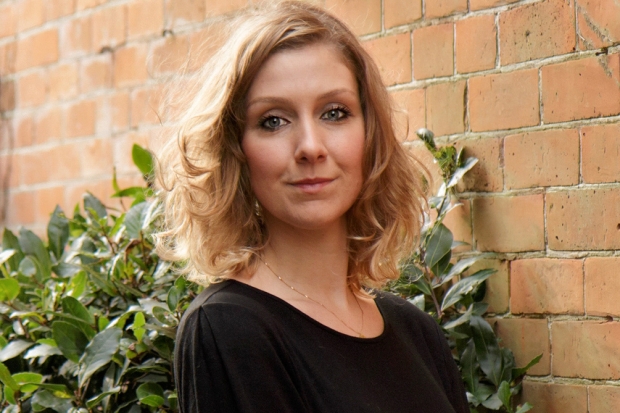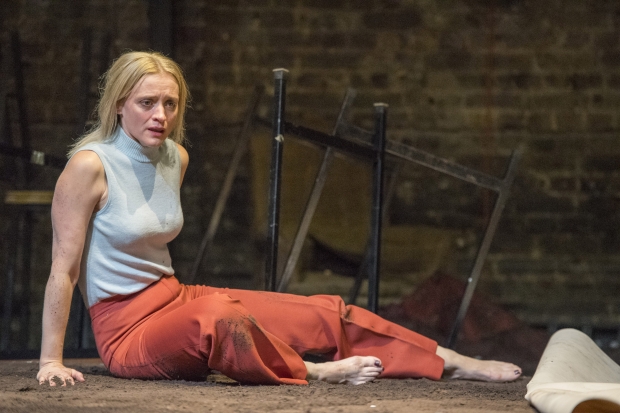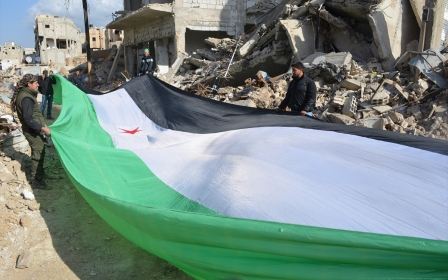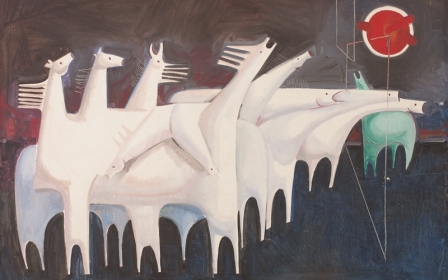UK playwright turns ire on Britain’s oil empire on London stage

LONDON - It starts in the 1890s with an American in a wide-brim hat arriving at the remote Cornish home of Anne-Marie Duff, offering a new-fangled form of gas to heat the cold farm. It ends in the later 21st century when the oil is running out and a Chinese saleswoman pops by with a glowing fusion-powered donut offering warmth and light in Duff’s twilight years. In the intervening scenes a new London play recounts a charged history of British involvement in oil extraction in Iran, Libya and the recent and future wars in Iraq.
Ella Hickson’s Oil seeks to distil into a troubled mother-daughter relationship nothing less than the birth, peak and imagined demise of Britain’s history of energy imperialism. It is ambitious and provocative, indicting British colonialism and the oil industry while also poking a finger at the thrusting capitalist version of feminism epitomised by leaders such as Theresa May and Hillary Clinton.
Hickson uses an unusual, some might say tenuous, metaphor for the difficult interplay between Britain and the Middle East oil producers: the fractious bond between an English mother and her daughter, played respectively by Duff and Yolanda Kettle.
The 31-year-old writer, who made her name as the voice of the new generation with state-of-the-nation works, readily admits that critics have been divided as to whether the metaphor works. “I guess it’s trying to find the point where our individual interactions with the oil industry occur in our daily lives. Often we point our finger at big corporations, but our individual responsibility has to take place at some point.”
'It’s funny how people say it’s a really big feminist play just because it has two female protagonists'
The reaction to the play’s critical stance on Britain’s colonial relationships with oil producing states – Oil depicts the beginnings of Britain’s iniquitous role in Iran, when her majesty’s government moved in to seize the country’s oil riches – has divided critics on political lines, says Hickson. “May’s a right-wing protagonist, an individualist capitalist. It’s funny but you would really think the right-wing press would like it.” She also denies that it is a feminist work.
“It’s funny how people say it’s a really big feminist play just because it has two female protagonists, when in fact, she (Duff) f***s everyone over in the service of her and her child’s personal advancement.”
Revolution
In a scene set in London in 1970, a representative of Colonel Gaddafi’s revolution in Libya arrives at the house of a later incarnation of May, now a well-off oil executive living with her rebellious teenage daughter. Played by Nabil Elouahabi, Mr Farous has come to tell her that she needs to sign a new agreement with Libya to hand over half the country’s oil revenues, or else.
Elouahabi, a veteran film and TV actor, tells MEE the character of Farouk jumped out at him when he read it. “He’s tied into a real history - the emergence of people like Gaddafi in the 1960s and 1970s, basically the sweeping changes in Africa from the colonial masters and puppets to their own leaders. King Idriss had been installed as a western-friendly king and was swept away.
“I like this character. He is saying right we are reappropriating what is ours. I loved the fact that he was educated, he was in control. I liked seeing that because there are certain Arab men who are often portrayed as kind of completely barmy or dictators. I liked what he represented.”
The oil exec is reluctant to accept Farouk’s ultimatum, and reacts with a contemptuous tirade as she dismisses the upstart revolution. In the end, her more pragmatic male colleague signs the new agreement.
Hickson says she wanted to get away from the clichés of macho oil executives as the cutout villains of the piece, and put a woman in the role of the hard-nosed, profit-hungry suit. Some have seen this as a feminist statement, but Hickson denies this. “Feminism is a complicated term, it’s a bit tricky – if you did the boardroom big male fat cat version, the problem is it lets everyone off the hook.”
'Feminism is a complicated term, it’s a bit tricky – if you did the boardroom big male fat cat version, the problem is it lets everyone off the hook'
Later in our conversation, Hickson lets it slip that her father was an engineer in the very industry that her play suggests is pillaging the Middle East. “My dad worked in the oil industry for his whole life so there’s not a lot about the oil industry I don’t know. He worked all over the world, in Korea, Abu Dhabi, Libya,” she says. Coming near the end of the interview, it is something of a bombshell. However she is reluctant to draw any kind of link between the play, an indictment of “oil-loving capitalism” and her own family history, including the mother-daughter relationship. “I’ve got a mum and dad and it’s a play about family.”
Oil's narrative makes it clear that the victims of Britain’s quest to obtain oil and gas from the start of the 20th century were Middle East nations including Iran and Iraq. However, with two white protagonists and a cast including two non-white actors in supporting roles, is there a danger of perpetuating the very hierarchy that the play sets out to expose? “I tried to make a point – the alternative is to write from the Iraqi or Persian point of view but what I tried to do is put our culpability front and centre.” Hickson says she could have written a play that focused on Arab or Iranian characters, but as a white Englishwoman, she asks: “Am I the person to write that play?”
Elouahabi said that the issue of having a mainly white cast would be valid if Oil was mainly a critique of British colonialism rather than a play about relationships. “The oil thing is almost a side show. The piece is really a mother and daughter story, I feel it’s about relationships. Everything else feeds into that tension.”
Future wars
The discomfort of the unequal relationship is palpable in act four, set in 2021 in an imagined future re-occupation of Iraq in which Britain again plays a role. This time Duff is a warmongering politician who follows her activist daughter to the Iraqi desert, where she is enjoying herself with Iraqi friend Amina, played by Lara Sawalha. “Amy standing in the Iraqi desert complaining about her boyfriend – it seems totally self-indulgent. And Amina says ‘f***ing go home, you’re here touristing out of our pain.”
'I sort of feel that there will probably be another big offensive as resources deplete. There is a hell of a lot [of oil] still there and I feel that won’t be left alone'
Amy’s personal angst in her journey of self-discovery seems to turn Iraq into little more than the sand on the stage, Amina a cypher for white middle-class navel-gazing. Hickson defends Amy and the scene. “It’s not like her pain isn’t real. Just because you’re in England and suffering, does it mean your suffering is less [than that of the Iraqis]?” She quickly answers herself: “Definitely your suffering is less.”
Hickson says of the future wars her play depicts: “I sort of feel that there will probably be another big offensive as resources deplete. There is a hell of a lot [of oil] still there and I feel that won’t be left alone. The play says we are going in there in the name of justice there but there is an underlying idea of capturing resources beneath it.”
Mining the moon
In the final futuristic scene of Oil, a Chinese saleswoman arrives at the unheated home of May and Amy and offers them an energy-clean solution to their woes. A beautiful glowing ring called a “toroid”, just big enough to sit on a coffee table, is presented to them. May, now old, says no, but Amy is enchanted. The cold, dark home lights up under the glow of the fusion device. Could something like this really be our energy future?
Hickson spoke to peak oil expert Colin Campbell and other energy specialists during research for the play and says: “The Chinese lunar mining programme has already begun… although they are mining for water rather than helium three at the moment. The future is fusion, as to whether it will be a little dinky home-made toroid…”
'I am kind of interested in the geopolitics of the next couple of hundred years and England’s diminishing place at the table'
Just back from China, Hickson’s future work is set to follow the speculative direction of the conclusion of the play. “I am kind of interested in the geopolitics of the next couple of hundred years and England’s diminishing place at the table. The next play is about China and reshuffling of the world powers. The status of those relationships is going to shift in the next little while.”
Hickson admits to being drawn to the Middle East as a subject for a future work, but says she would need to spend time there before venturing to write Arab characters and themes centred on the region. “I am fascinated by the Middle East. I would need to spend quite a long time there. There is always a struggle – an issue of the right to speak about something.”
Oil continues at the Almeida Theatre in London until 26 November
Middle East Eye propose une couverture et une analyse indépendantes et incomparables du Moyen-Orient, de l’Afrique du Nord et d’autres régions du monde. Pour en savoir plus sur la reprise de ce contenu et les frais qui s’appliquent, veuillez remplir ce formulaire [en anglais]. Pour en savoir plus sur MEE, cliquez ici [en anglais].






